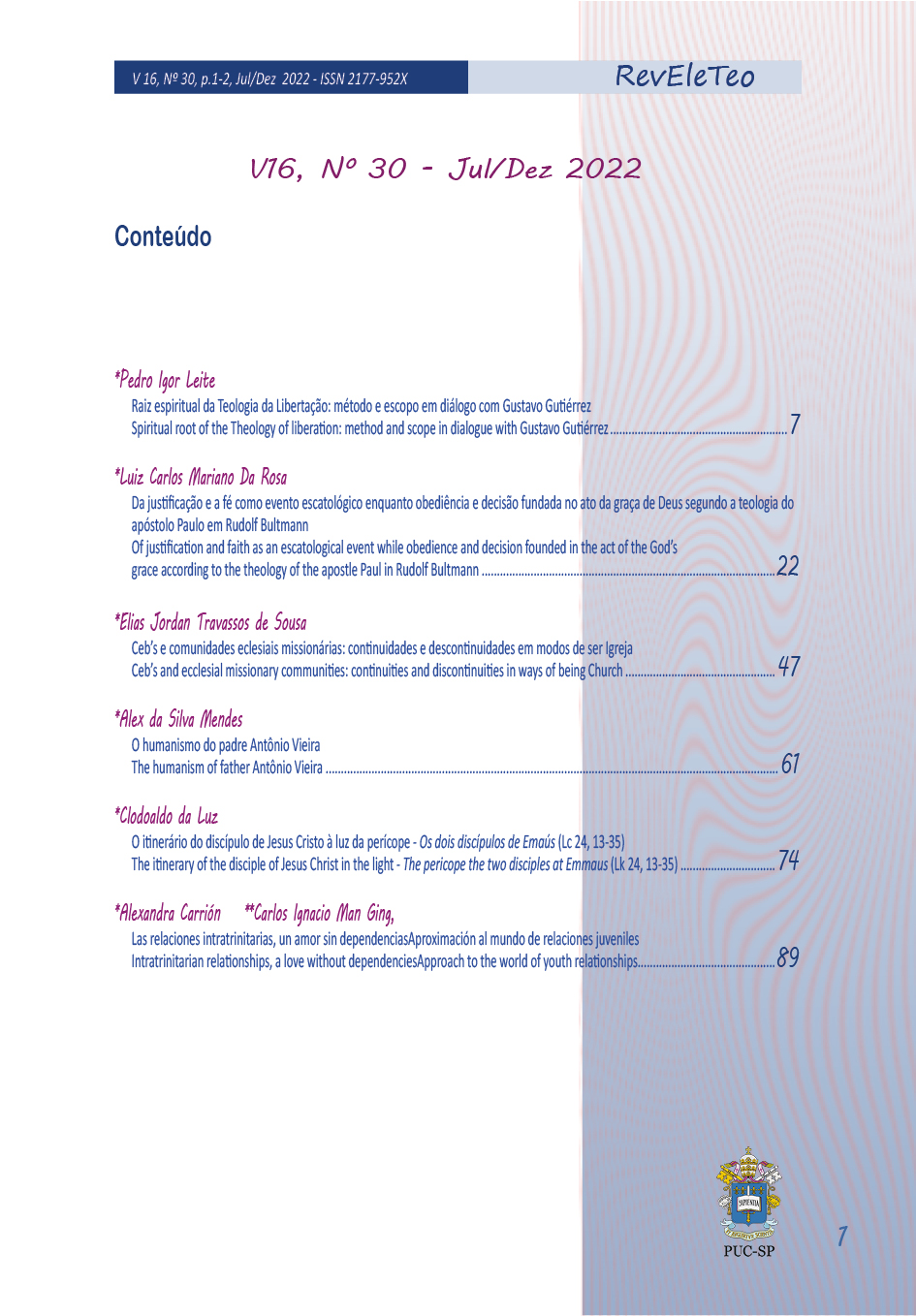O humanismo do padre Antônio Vieira
DOI:
https://doi.org/10.23925/2177-952X.2022v16i30p61-73Palavras-chave:
Padre Antônio Vieira, Humanismo, Sermões, Ética pastoralResumo
O profundo humanista e homem de ação que foi Vieira, não podia ficar indiferente à brutalidade com que os índios e os escravos negros eram tratados no Brasil. Uma prática, aliás, consentida por toda a Europa colonizadora. O missionário tudo viu e tudo denunciou na corte portuguesa. O que pedia era dignidade e tolerância para com os povos subjugados. Conhecedor da realidade, o humanista cristão atravessou praticamente todo o século XVII atento aos problemas políticos, econômicos, sociais e religiosos, com propostas reformistas avançadas para a mentalidade da época. Como a defesa dos direitos humanos dos índios ou o fim da discriminação que existia entre cristãos-novos e cristãos-velhos. Em sua obra profética a Clavis Prophetarum, Vieira expõe seus sonhos de reconciliação entre judeus e cristãos. De acordo com (COUTO, 2009, p. 99), três sermões da série de 30 são consagrados exclusivamente à escravidão negra: 14º, 20º, 27º. Esses três sermões foram pregados diretamente aos negros da Irmandade do Rosário dos Pretos. Vieira passou a maior parte do ano de 1653 em São Luís, onde defendia a liberdade dos índios no seu sermão da Primeira Dominga de Quaresma (ou das Tentações).
Referências
BOSI, Alfredo. Dialética da colonização. São Paulo: Companhia das Letras, 1992.
HOMEM, Edson de Castro. Nossos santos de cada dia/ Dom Edson de Castro Homem – Rio de Janeiro: Casa da Palavra, 2012, p. 398.
HISTORY CHANNEL BRASIL, Padre Antônio Vieira é intimado a depor no tribunal da inquisição. 19 de junho de 2019. Disponível em: https://history.uol.com.br/hoje-na-historia/padre-antonio-vieira-e-intimado-depor-no-tribunal-da-inquisicao. Consulta realizada em: 18 de novembro de 2021.
LATOURETTE, Kenneth Scott. História del Cristianismo. s/l Casa Bautista de Publicaciones.1977.
Padre Antônio Vieira: 400 anos depois/ Organização Lélia Parreira Duarte, Maria Theresa Abelha Alves. Belo Horizonte: Ed. PUC Minas, 2009.
PORTO, Padre Humberto. Os protocolos do Concílio Vaticano II: sobre os judeus. Edições Diálogo. Av. Higienópolis, 983. São Paulo, 1983.
SILVA, da Silva. Visões protestantes sobre a escravidão. Revista de Estudos de Religião, Nº 1/ 2003/ pp. 1-26, ISSN 1677-1222. Disponível em: https://www.pucsp.br/rever/rv1_2003/p_silva.pdf. Consulta realizada em: 12 de novembro de 2021.
TEB – Tradução Ecumênica da Bíblia. Edições Loyola, São Paulo, Brasil, 1996.
THIELEMANN, Wagner. Von der göttlichen Sendung Portugals: Vieira wider die Vertreibung der Jeuiten aus Maranhão. Lusorama, Frankfurt, outubro 2001.
VIEIRA, Padre Antônio. O Sermão da Epifania foi proferido no dia 6 de janeiro de 1662, na Capela Real de Lisboa.
VIEIRA, Padre Antônio. Clavis Prophetarum. Obras Escolhidas, Livraria Sá da Costa, Lisboa,1953. Edição eletrônica: Richard Zenker. Disponível em: https://www.literaturabrasileira.ufsc.br/documentos/?action=download&id=6266. Consulta realizada em: 18 de novembro de 2021.
VIEIRA, Padre Antônio. Sermão Décimo Quarto em 1633 (do Rosário), (Trechos). Para o orador dia de São João Evangelista, dia de Nossa Senhora do Rosário e dia dos escravos. Disponível em: https://historiaafrosuzano.files.wordpress.com/2016/10/sermc3a3o-decimo-quarto.pdf. Consulta realizada em: 20 de novembro de 2021.





